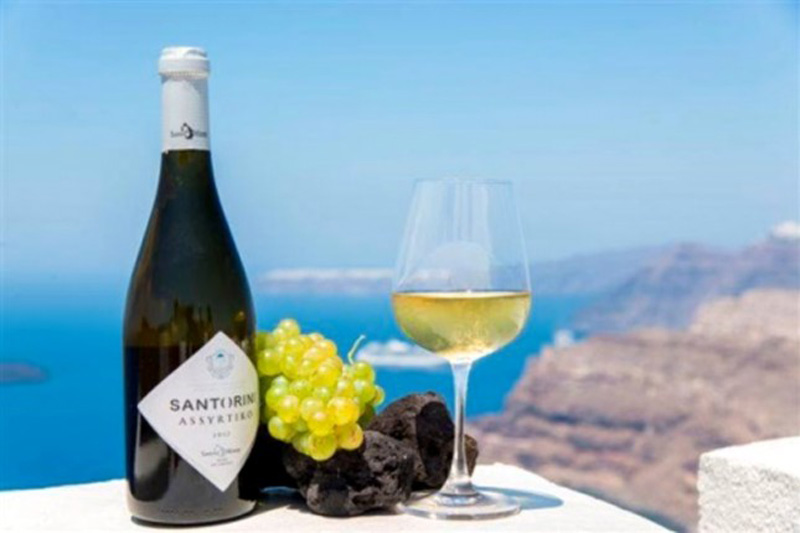The Greek empire of antiquity helped to spread viticulture across the known world, to the neighbouring Romans, and as far away as Persia.
Winemaking in Greece goes back 6500 years, and has survived the end of empires, the rise and fall of tyrants, natural disasters great and small, and the inexorable march of time.
While grapes grow all over the Greek mainland and the thousands of surrounding islands in the Aegean and Ionian seas, my favourite Greek wines have always come from the island of Santorini.
Famed for its red and black sand beaches, the island of Santorini appeared out of the sea from nearly 2 million years of volcanic activity, as the earth turns itself inside out. Santorini has been built up in layers, with the last major eruption happening 2600 years ago, blanketing the island with tens of meters pumice and magma, entirely burying the civilizations of the day.
Modern archeologists are giddy as schoolgirls to visit a dig in Santorini, finding entire buried villages in remarkably well-preserved states nearly three millennia later.
The mineral-rich volcanic soil makes the wines of Santorini unique, with hardy rootstocks that can live for centuries. When a grapevine reaches the ripe old age of 75 years or so, the winemaker will clip off the decrepit vine and graft a new young vine to the old root, which may have worked its way dozens of meters in the rocky soils, pulling moisture and mineral nutrients from far below the surface.
The island of Santorini is also the ancestral home of Assyrtiko, perhaps the most famous of the grape varietals from Greece.
I first encountered the Assyrtiko grape during a visit to the island of Santorini in the early years of the new millennium, and was most surprised by the unique viticultural practices on the island. Rather than training the vines to grow along trellises or guy wires in the French or Italian styles, the vineyards of Santorini weave the grapevines into a basket-like shape, with the grapes pointed inwards, and the outer leaves protecting the grapes from the harsh sun and winds.
While Santorini has been producing wines for millennia, they first rose to fame on the world stage in the days of the Byzantine Empire, shortly after the fall of Constantinople, now known as present-day Istanbul.
Santorini fell under the rule of the Republic of Venice in the 1200s, and Venetian traders shipped the wine far and wide, gathering acclaim wherever it went, as the sugar-rich and high-alcohol wines of Santorini were one of the few wines of the era that could survive a long sea voyage without spoiling in the heat.
The hardiness of Santorini wine comes from a unique winemaking tradition, and wine made in this style is referred to as Vinsanto. The grapes are harvested late in the season to ensure maximum ripeness and sugar content, and are then dried in the sun for 14 days to concentrate the flavour by reducing the water content.
The grapes are then crushed and fermented, then aged in oak for a minimum of 2 years. Although technically made from white wine grapes, the colour tends to be more of a golden orange hue, with notes of dried apricot and a rich raisiny bouquet, followed by a citrusy zest on the tongue.
The wine leans on the sweeter side of the scale, so fans of bone-dry wines will typically not care for Vinsanto, although the sweetness is balanced with high levels of natural acidity, making the wine pair well with many foods.
Not all winemakers choose to follow the traditional methods of making Vinsanto, with some modern vintners opting to age the wine in stainless steel vats instead of oak, resulting in a flinty, mineral-forward bouquet from the volcanic soils, and a rich nutty, almost silky feeling on the tongue.
Whatever your preference, the wines of Santorini reflect a long and storied history, and are a welcome addition to any meal. Try a glass at your next outing to a Greek restaurant, or have pair a bottle at home the next time you make lamb or fish. You will find many examples at your friendly neighbourhood bottle shop, so pick one up today!






